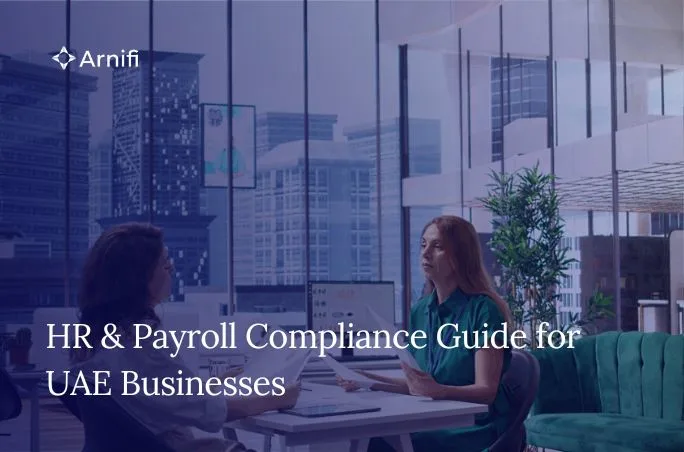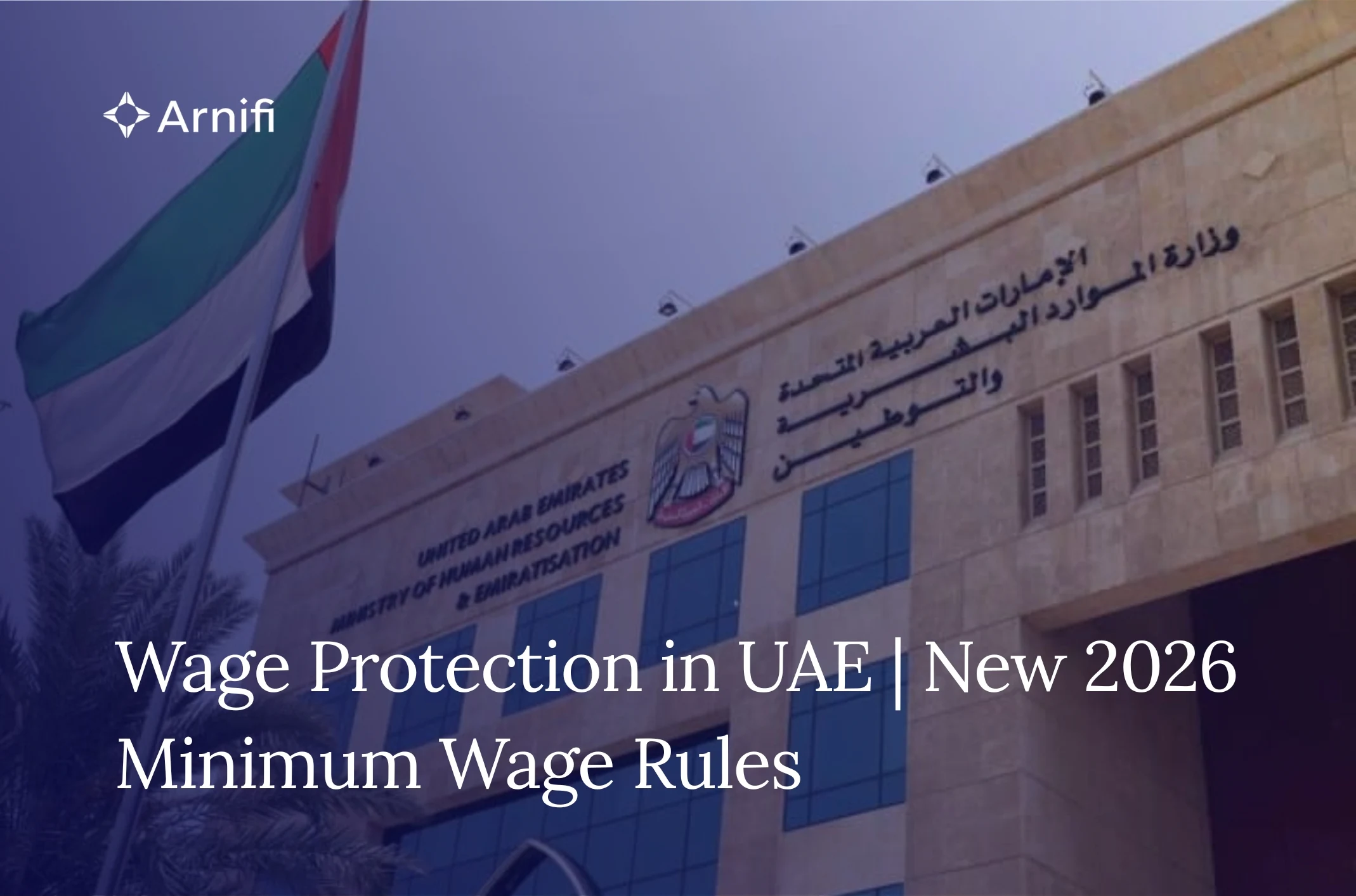Understanding Minimum Wage and Benefits for Workers in UAE
by Shethana May 16, 2025  6 MIN READ
6 MIN READ

The UAE has yet to establish a minimum wage, leading to one of the most common questions asked by those aiming to hire or expand their staff or entry-level workers seeking employment: What is the minimum wage? While the question may appear straightforward, an in-depth response must include layers of context and legal considerations.
Table of contents
This article provides a practical and straightforward overview of the wage structure as it currently operates in the UAE. Any person prescribing salary packages, checking employment opportunities, or financing projects for their organisation ought to know how wages are structured and the kinds of benefits they will include. We took care to strip away needless complexity to highlight only the vital information.
So, Is There a Minimum Wage in UAE?
Here’s the thing – The UAE doesn’t have one set minimum wage for all workers. You won’t find an official number in a rulebook saying, “Every employee must earn at least X dirhams per month.” But that doesn’t mean there are no rules at all.
In 2022, the UAE’s updated labour law (Federal Decree Law No. 33) gave the government the power to set minimum wages by job or qualification level. But so far, it hasn’t issued a clear-cut list of minimums by profession. Most salaries follow specific patterns based on job type, skill, and experience.
Pay Looks Different Depending on the Role
There’s a big difference between a senior engineer and a delivery driverregardingo monthly income in the UAE. In most cases, wages follow this general divide:
Blue-Collar Jobs
These roles involve physical labour—construction, cleaning, driving, and domestic help. Here’s what the numbers look like:
- Construction workers: On average, they earn around AED 117,000 a year. That’s about AED 9,750 per month if you break it down.Of course, some employers pay more, mainly if employees handle specialised machinery or speak multiple languages.
- Housemaids and domestic helpers: Salaries range from AED 1,200 to AED 3,000 monthly. It often depends on experience, nationality, and whether the job is live-in.
- Delivery drivers and warehouse staff: These roles usually fall between AED 2,500 and AED 5,500 per month, depending on the company, working hours, and commission structures.
White-Collar Jobs
Now, for office and professional roles, these salaries vary greatly depending on education and industry.
- The monthly salaries depend on the field. Starting finance jobs pay at least AED 1,800, AED 5,000 for entry-level IT jobs, and between AED 12,000 and 20,000 for experienced developers and network engineers.
- Engineers earn anywhere between AED 8,000 and AED 30,000 every month, depending on their experience and certifications.
- Teaching jobs: If you are teaching in private schools, wages may be between AED 6,000 and AED 15,000 monthly, depending on the subjects taught and the school’s qualifications.
- Doctors and healthcare professionals: General practitioners get paid from AED 15,000 to AED 25,000. Specialists who are very highly experienced earn at least AED 40,000.
These are just ballpark figures, but they act as a solid framework to set expectations, whether you are an employer or a job seeker.
What’s the Wage Protection System (WPS)?
Let’s say you land a job or you’re hiring someone. How do you make sure wages are adequately paid? That’s where the Wage Protection System (WPS) comes in.
It’s an electronic payment system managed by the Ministry of Human Resources and Emiratisation (MOHRE). Employers must use it to pay salaries, not cash, and no under-the-table deals. WPS ensures salaries go through a registered UAE bank, creating a record and helping avoid payment issues.
Starting from April 2025, new job categories—like private tutors and home caregivers- have been added to the WPS system. So if you’re hiring for one of those roles, the same rules apply.
What Benefits Are Employees Entitled To?
Salaries are just one part of the picture. Here’s what else you need to factor in, whether you’re running a business or planning your finances:
- Annual leave: Once employees complete a year, they become eligible for 30 days of paid vacation, which is a legal right and not a peak.
- Gratuity (End-of-Service): Employees are entitled to a lump sum when they leave the company. It’s usually 21 days of pay for each year worked (first five years), and 30 days for anything beyond that.
- Health insurance: In most Emirates, this is mandatory. Employers must cover it. In Dubai and Abu Dhabi, they cannot negotiate it.
- Maternity and paternity leave: Women receive 60 days of maternity leave, while employers give men five working days. Some companies offer more, but that’s the legal minimum.
A Real-World Example: Doing the Math
Let’s say you run a small company in Dubai. You’re hiring a junior developer, a cleaner, and a delivery driver.
- The developer earns AED 8,000/month.
- The cleaner gets AED 1,800/month.
- The driver makes AED 3,500/month.
Add around 15–20% extra for benefits like health insurance, end-of-service, and WPS processing. That means your monthly wage bill for these three might hit AED 16,000–17,000. Planning for this upfront helps you avoid unexpected cash flow issues. On the flip side, if you’re someone considering a move to the UAE, this kind of breakdown gives you a clearer idea of what you’ll receive, not just the base pay but also the benefits that come with it.
Why This Matters for Employers and Employees?
Understanding how wages and benefits work in the UAE isn’t just for HR teams or accountants. If you’re an employee, you deserve to know your rights and what’s standard. If you’re an employer, getting this wrong can cost you, not just in fines, but in staff turnover and trust.
At Arnifi, we work with companies of all sizes, from lean startups to multinational firms, to help them build strong, compliant teams in the UAE. Whether it’s salary planning, onboarding, or navigating new employment rules, we’re here to simplify the process.
Key Takeaways
The UAE may not have a fixed minimum wage yet, but that doesn’t mean anything goes. Market norms, legal safeguards, and employee expectations all play a role in shaping fair pay. If you’re planning to hire—or you’re job hunting—knowing what’s reasonable and legal makes all the difference.
Check What Arnifi’s HR Solutions Offer
Arnifi HR solutions ease the hiring process in the UAE as everything fully complies with labour laws, visas, WPS, and insurance, thereby eliminating legal risks. No local entity setup is required, which means some time and cost savings. Quick and efficient onboarding means your team can begin work within a matter of days.
From basic to premium, our flexible plans cater to the needs and budgets of different businesses. And with the fully transparent pricing, you’ll never have to worry about hidden fees. For hassle-free, compliant, efficient, and affordable hiring in the UAE, look no further than Arnifi HR. For better understanding, get a free consultation now!
Top UAE Packages

Related Articles
Top UAE Packages



